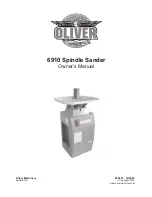
persons in the vicinity. Comply with the
safety regulations that apply in your coun
try. Connect the power tool to a suitable
dust extractor.
–
Wear at least a P2 respiratory mask to
protect your health. Ensure there is ade
quate ventilation in enclosed spaces.
–
Use a residual-current circuit break
er (RCCB) or an isolating transformer if
operation of the power tool in a damp en
vironment cannot be avoided. In the event
of an electric shock, the residual-current
circuit breaker (RCCB) or isolating trans
former protects you against life-threaten
ing current through the body.
–
If potentially explosive or self-igniting dust
is produced during sanding, the machining
instructions issued by the material manu
facturer must always be followed.
–
Caution: Fire hazard! Prevent the material
being sanded and the sander from over
heating. Always empty the dust container
before taking breaks from work. Grinding
dust in the filter bag and/or in the filter of
the mobile dust extractor may ignite spon
taneously under unfavourable conditions,
such as flying sparks, when sanding. There
is a particular risk if the sanding dust is
mixed with clear coats or polyurethane res
idues or other chemical substances and the
material being sanded becomes hot after it
has been worked on for a long time.
–
Metals and materials that contain asbes
tos must not be processed. Sparks may be
created in the dust bag when processing
metals. This increases the risk of fire.
–
Hold the power tool firmly with both hands
and maintain a stable stance when per
forming work. Using both hands ensures
that the power tool is guided safely, see
Section
–
Warning of harmful light radiation.
Do not look into the light beam for long
periods. Do not direct the light beam to
wards other people or animals. Optical ra
diation can damage the eyes.
–
Always use an antistatic suction hose (AS)
with the power tool. A slight electric shock
may cause you to panic briefly and become
distracted, which may result in an accident.
–
Always use original Festool backing pads.
Pads from other manufacturers can break.
3.4
Health hazard by dust
WARNING! various dust created by pow
er sanding, sawing, grinding, drilling and
other construction activities contains chemicals
known (to the State of California) to cause can
cer, birth defects or other reproductive harm.
Some examples of these chemicals are:
•
lead from lead-based paints,
•
crystalline silica from bricks and cement
and other masonry products, and
•
arsenic and chromium from chemically
treated lumber.
The risk from these exposures varies, depend
ing on how often you do this type of work. To re
duce your exposure to these chemicals: work in
a well ventilated area, and work with approved
safety equipment, such as dust masks that are
specially designed to filter out microscopic par
ticles. Wash hands after handling.
WARNING
TO REDUCE THE RISK OF INJURY, USER
MUST READ INSTRUCTION MANUAL.
4
Intended use
The long-reach sander is designed for sanding
primed drywall constructions, ceilings and
walls indoors as well as for removing carpet
residue and coats of paint indoors.
A maximum of two extension tubes can be
used.
The long-reach sander is not suitable for wet
sanding and for working with oil and polishing
agents.
Not suitable for continuous industrial opera
tion.
The user is liable for improper or non-in
tended use.
5
Technical data
Long-reach sander
LHS 2 225 EQI
Power
400 W
Speed (no-load)
5000–8500 min
-1
Sanding stroke
5/32" (4 mm)
English
9










































